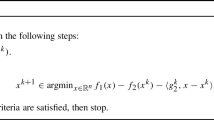Abstract
This paper is concerned with the convergence property of Dikin's algorithm applied to linearly constrained smooth convex programs. We study a version of Dikin's algorithm in which a second-order approximation of the objective function is minimized at each iteration together with an affine transformation of the variables. We prove that the sequence generated by the algorithm globally converges to a limit point at a local linear rate if the objective function satisfies a Hessian similarity condition. The result is of a theoretical nature in the sense that in order to ensure that the limit point is an ε-optimal solution, one may have to restrict the steplength to the order ofO(ε). The analysis does not depend on non-degeneracy assumptions.
Similar content being viewed by others
References
E.R. Barnes, A variation on Karmarkar's algorithm for solving linear programming problems, Mathematical Programming 36(1986)174–182.
E.R. Barnes, Some results concerning convergence of the affine scaling algorithm, in:Contemporary Mathematics, vol. 114, ed. J.C. Lagarias and M. Todd (AMS Publ., Providence, USA) pp. 131–140.
I.I. Dikin, On the speed of an iterative process, Upravlyaemye Sistemi 12(1974)54–60.
I.I. Dikin, Convergence of a sequence of dual variables at the solution of a completely degenerate problem of linear programming, presented at the15th International Symposium on Mathematical Programming, Ann Arbor, MI, USA (1994).
R. Fletcher,Practical Methods in Optimization, vol. 1 (Wiley, New York, 1986).
I. Litvinchev, Polynomial complexity of the affine-scaling algorithm, presented at the15th International Symposium on Mathematical Programming, Ann Arbor, MI, USA (1994).
C. Luz, Superlinear variant of the dual affine scaling algorithm, presented at the15th International Symposium on Mathematical Programming, Ann Arbor, MI, USA (1994).
S. Mehrotra and J. Sun, An interior point algorithm for solving smooth convex programs based on Newton's method, in:Contemporary Mathematics, vol. 114, ed. J.C. Lagarias and M. Todd (AMS Publ., Providence, USA, 1990) pp. 265–284.
R.D.C. Monteiro, T. Tsuchiya and T. Wang, A simplified global convergence proof of the affine scaling algorithm, Annals of Operations Research 49(1993)443–482.
Y. Nesteroy and A. Nemirovskii,Interior Point Polynomial Methods in Convex Programming (STAM, Philadelphia, USA, 1993).
R.T. Rockafellar,Convex Analysis (Princeton University Press, Princeton, NJ, USA, 1970).
C. Roos, C.C. Gonzaga, B. Jansen and T. Terlaky, Convergence properties of the primal affine scaling method for the homogeneous programming problem, presented at the15th International Symposium on Mathematical programming, Ann Arbor, MI, USA (1994).
R. Sheu and S. Fang, Insight into the interior point methods, ZOR 36(1992)227–257.
R. Saigal, Efficient variants of the affine scaling method, Technical Report 93-21, Dept. of Industrial and Operations Engineering, University of Michigan, Ann Arbor, MI, USA (1993).
J. Sun, A convergence proof for an affine-scaling algorithm for convex quadratic programming without non-degeneracy assumptions, Mathematical Programming 60(1993)69–79.
J. Sun and L. Qi, An interior point algorithm of\(O(\sqrt m |In{\text{ }}\varepsilon |)\) iterations forC 1-convex programming, Mathematical Programming 57(1992)239–258.
P. Tseng and Z.-Q. Luo, On the convergence of the affine-scaling algorithm, Mathematical Programming 56(1992)301–319.
T. Tsuchiya, Global convergence property of the affine scaling methods for primal degenerate linear programming problems, Mathematics of Operations Research 17(1992)527–557.
T. Tsuchiya, Degeneracy and the affine-scaling algorithm, presented at the15th International Symposium on Mathematical Programming, Ann Arbor, MI, USA (1994).
T. Tsuchiya and M. Muramatsu, Global convergence of a long-step affine scaling algorithm for degenerate linear programming problems, Research Memorandum No. 423, The Institute of Statistical Mathematics, Tokyo, Japan, to appear in SIAM Journal on Optimization.
R.J. Vanderbei and J.C. Lagarias, Dikin's convergence result for the affine-scaling algorithm, in:Contemporary Mathematics, vol. 114, ed. J.C. Lagarias and M. Todd (AMS Publ., Providence, USA, 1990) pp. 109–120.
R.J. Vanderbei, M.S. Meketon and B.A. Freeman, A modification of Karmarkar's linear programming algorithm, Arithmica 1(1986)395–407.
Y. Ye, On affine scaling algorithms for nonconvex quadratic programming, Mathematical Programming 56(1992)285–300.
Y. Ye, A new complexity result on minimization of a quadratic function over a sphere constraint, in:Recent Advances in Global Optimization, ed. C. Floudas and P. Pardalos (Princeton University Press, Princeton, NJ, USA, 1992).
Author information
Authors and Affiliations
Rights and permissions
About this article
Cite this article
Sun, J. A convergence analysis for a convex version of Dikin's algorithm. Ann Oper Res 62, 357–374 (1996). https://doi.org/10.1007/BF02206823
Issue Date:
DOI: https://doi.org/10.1007/BF02206823



